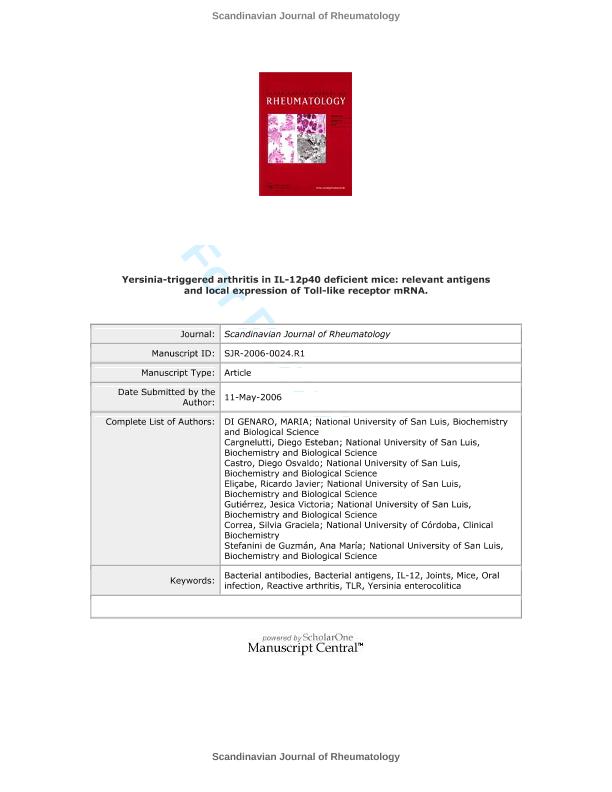Artículo
Yersinia-triggered arthritis in IL-12p40-deficient mice: Relevant antigens and local expression of Toll-like receptor mRNA
Di Genaro, Maria Silvia ; Cargnelutti, Diego Esteban
; Cargnelutti, Diego Esteban ; Castro, D. O.; Eliçabe, Ricardo Javier
; Castro, D. O.; Eliçabe, Ricardo Javier ; Gutiérrez, J. V.; Correa, Silvia Graciela
; Gutiérrez, J. V.; Correa, Silvia Graciela ; De Guzmán, A. M. S.
; De Guzmán, A. M. S.
 ; Cargnelutti, Diego Esteban
; Cargnelutti, Diego Esteban ; Castro, D. O.; Eliçabe, Ricardo Javier
; Castro, D. O.; Eliçabe, Ricardo Javier ; Gutiérrez, J. V.; Correa, Silvia Graciela
; Gutiérrez, J. V.; Correa, Silvia Graciela ; De Guzmán, A. M. S.
; De Guzmán, A. M. S.
Fecha de publicación:
12/2007
Editorial:
Taylor & Francis As
Revista:
Scandinavian Journal Of Rheumatology
ISSN:
0300-9742
e-ISSN:
1502-7732
Idioma:
Inglés
Tipo de recurso:
Artículo publicado
Clasificación temática:
Resumen
To study the role of IL-12p40 at the onset of reactive arthritis (ReA) after Yersinia enterocolitica O:3 infection, and analyse relevant microbial antigens and articular expression of Toll-like receptor (TLR) mRNA. Methods: Wild-type C57BL/6 and IL-12p40-deficient (IL-12p40-/-) mice were orogastrically infected with Y. enterocolitica O:3. Early (day 3) and late (day 21) after infection, the number of bacteria were determined in Peyer's patches (PP), mesenteric lymph nodes (MLN), the spleen, and joints. Histological studies of joints were performed. Collagen-specific and anti-Yersinia antibodies were measured by enzyme-linked immunosorbent assay (ELISA). The presence of Yersinia antigens was studied by dot blot. Induction of articular mRNA of TLR2, TLR4, and tumour necrosis factor (TNF)-α was analysed by reverse transcription-polymerase chain reaction (RT-PCR). TNFα protein levels were measured by ELISA. Results: At day 3, bacterial recovery in PP, MLN, and spleen was significantly increased in IL-12p40-/- mice. Histopathological changes were observed in IL-12p40-/- mice at day 21 after infection, and correlated with higher antibody response against type II collagen. Although live bacteria could not be isolated at day 21 after infection, articular microbial components, especially from the outer membrane (OM), were detected. Moreover, intra-articular immunoglobulins to Yersinia antigens were significantly higher in IL-12p40-/- mice. Furthermore, mRNA levels for TLR2, TLR4 and TNFα, and TNFα protein were increased in joints from IL-12p40-/- mice. Conclusions: We concluded that IL-12p40 influences the resistance against Yersinia-triggered ReA. Bacterial products such as Yersinia OM could contribute to the ReA by induction of articular TLR expression, which results in an inflammatory response in the joint. © 2007 Taylor & Francis on license from Scandinavian Rheumatology Research Foundation.
Palabras clave:
ARTHRITIS
,
YERSINIA
,
INFLAMMATION
,
GUT
,
ARGENTINA
Archivos asociados
Licencia
Identificadores
Colecciones
Articulos(CIBICI)
Articulos de CENTRO DE INV.EN BIOQUI.CLINICA E INMUNOLOGIA
Articulos de CENTRO DE INV.EN BIOQUI.CLINICA E INMUNOLOGIA
Articulos(IMIBIO-SL)
Articulos de INST. MULTIDICIPLINARIO DE INV. BIO. DE SAN LUIS
Articulos de INST. MULTIDICIPLINARIO DE INV. BIO. DE SAN LUIS
Citación
Di Genaro, Maria Silvia; Cargnelutti, Diego Esteban; Castro, D. O.; Eliçabe, Ricardo Javier; Gutiérrez, J. V.; et al.; Yersinia-triggered arthritis in IL-12p40-deficient mice: Relevant antigens and local expression of Toll-like receptor mRNA; Taylor & Francis As; Scandinavian Journal Of Rheumatology; 36; 1; 12-2007; 28-35
Compartir
Altmétricas



